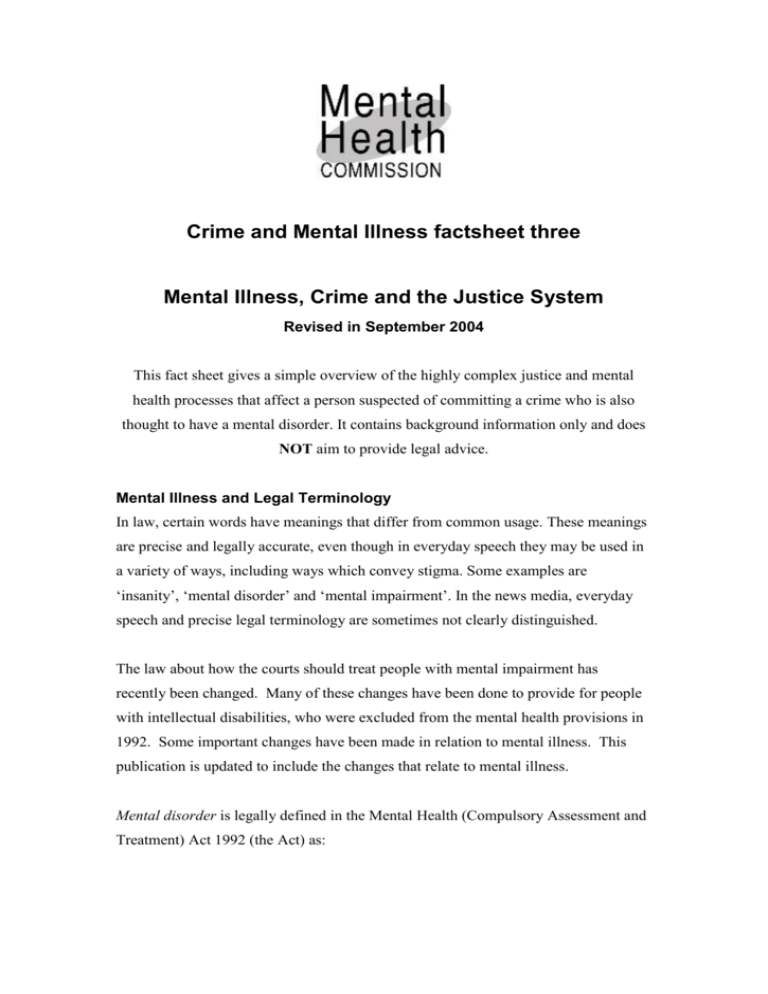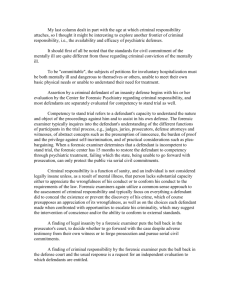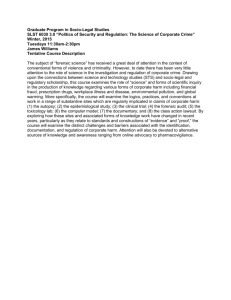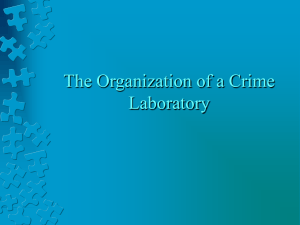Fact Sheet Three: Mental Illness, Crime and the Justice System
advertisement

Crime and Mental Illness factsheet three Mental Illness, Crime and the Justice System Revised in September 2004 This fact sheet gives a simple overview of the highly complex justice and mental health processes that affect a person suspected of committing a crime who is also thought to have a mental disorder. It contains background information only and does NOT aim to provide legal advice. Mental Illness and Legal Terminology In law, certain words have meanings that differ from common usage. These meanings are precise and legally accurate, even though in everyday speech they may be used in a variety of ways, including ways which convey stigma. Some examples are ‘insanity’, ‘mental disorder’ and ‘mental impairment’. In the news media, everyday speech and precise legal terminology are sometimes not clearly distinguished. The law about how the courts should treat people with mental impairment has recently been changed. Many of these changes have been done to provide for people with intellectual disabilities, who were excluded from the mental health provisions in 1992. Some important changes have been made in relation to mental illness. This publication is updated to include the changes that relate to mental illness. Mental disorder is legally defined in the Mental Health (Compulsory Assessment and Treatment) Act 1992 (the Act) as: “an abnormal state of mind (whether of a continuous or intermittent nature), characterised by delusions, or by disorders of mood or perception or volition or cognition, of such a degree that it – (a) Poses a serious danger to the health or safety of that person or of others; or (b) Seriously diminishes the capacity of that person to take care of himself or herself.” This strict New Zealand legislative definition differs from use of the term ‘mental disorder’ in publications such as the Diagnostic and Statistical Manual of the American Psychiatric Association (DSM), where it describes the various syndromes of mental distress. Mental impairment is not defined in the statute, but it is a recently introduced legal test designed to include mental disorder as well intellectual disability. A person is found to be unfit to stand trial by the courts if a judge has decided that, due to a person’s mental impairment, they are incapable of knowing whether to plead guilty or not guilty, or of understanding the consequences of legal proceedings or of instructing a lawyer. Section 4 of the Criminal Procedure (Mentally Impaired Persons) Act 2003 defines the circumstances in which a person may be held to be ‘unfit to stand trial’. Insanity, in the legal system, has a strictly defined meaning (see Section 23 of the Crimes Act 1961). It is completely outmoded as a psychiatric or medical term. It is also used in common speech, where it conveys the stigma of mental illness, either through slang (“you’d have to be insane to…etc.”) or in media headlines referring to “insane killers”. Police Police have powers to arrest a person when they suspect a criminal offence has been committed. If the police think the person is ‘mentally disordered’ they are likely to ask for a psychiatric assessment or, if a minor crime, may not press charges and may call in the mental health crisis team. It is for the courts, not the police, to make judgments about whether a person’s mental state needs to be taken into account in the trial process and in sentencing. Police have certain other powers in relation to people with mental disorders. They can assist Duly Authorised Officers (DAOs), that is, mental health professionals with certain powers under the Mental Health Act, with transporting someone to a mental health facility. Police may also apprehend someone who seems to be mentally disordered in a public place (the legal term is “wandering at large”) and take them in for an examination by a medical practitioner. Neither of these actions involve arrests. The Courts Remand for Psychiatric Assessment At the first court appearance it may be decided to remand the person under section 38 of the Criminal Procedure (Mentally Impaired Persons) Act 2003 for further investigation of their mental status in the form of a psychiatric examination. The accused may be remanded on bail with a condition being that they must have an examination, or they may be remanded in custody, or they may be sent to an inpatient mental health facility. The decision to remand to inpatient care will be based on an assessment by a health assessor (e.g. a psychiatrist). The outcome of the psychiatric examination has a bearing on fitness to plead, the type and length of sentence, or conditions imposed as part of a sentence. Once the health assessor’s report has been received, the court may order the defendant to be detained in hospital until a hearing or trial. Although this remand period may last a considerable time, there is also explicit provision in the new law allowing an application to be made to the Court to review or revoke the order. Trial Processes and Outcomes Unfit to stand trial A person cannot be found unfit to stand trial unless the court is satisfied that there is sufficient evidence that they could be physically responsible for the crime they are alleged to have committed. This is a new requirement. If someone is found to be unfit to stand trial one of the things which may occur is that they may be detained as a special patient (see below for a definition of ‘special patient’.) This can only occur if it is considered necessary. They must have regular clinical reviews and may be found fit to stand trial at a later date. Under section 30 Criminal Procedure (Mentally Impaired Persons) Act 2003 the maximum period of detention for special patients is 10 years where the person would have been liable to life imprisonment if convicted. In all other cases, detention can be for up to half the maximum term of imprisonment a person might have received if found guilty of the crime with which they were charged. At the end of this period, or if during their detention they become well enough to stand trial, the Attorney-General will decide, acting on advice, whether a trial should proceed or whether the person's status should change from being a special patient to someone who is subject to a compulsory treatment order under the Mental Health (Compulsory Assessment and Treatment) Act 1992. As someone under compulsory treatment, processes for obtaining leave are less restricted, and discharge can occur if they are no longer ‘mentally disordered’ (as defined in the Act.) Both the prosecution and defence can appeal either a finding of fitness to stand trial or unfitness to stand trial. Criminal responsibility and the insanity defence Having a legally defined mental disorder does not necessarily mean that an insanity defence would be successful. Criminal responsibility involves mental culpability at the time of the offence. In law this means that, as well as establishing that the person actually committed the crime, it also has to be established that they had a ‘guilty mind’ (mens rea) at the time. Only if the person is so disordered in their mind that they did not know what they were doing, or if they are incapable of understanding that their actions were morally wrong, can they be classified as ‘legally insane’. Only a handful of people each year are found not guilty by reason of insanity. Previously, this finding could only be made at the end of a trial. Now, under s. 20(2) Criminal Procedure (Mentally Impaired Persons) Act 2003, if the lawyers on both sides agree, and if the judge is satisfied by expert evidence that the person was legally insane, a finding of not guilty by reason of insanity can be entered without the need for a trial. If someone is acquitted on grounds of insanity they may be detained as a special patient. Or, if the judge decides that they are not a danger to the public, they may become subject to a compulsory treatment order under the Act (as a patient), or they maybe discharged, although both of these are unlikely outcomes. An acquitted person has not been convicted of a crime, and the length of time people are detained as special patients is determined by the Minister of Health who is informed by the recommendations of the Director of Mental Health in the Ministry of Health. The Minister will consider whether the person needs to continue to be held as a special patient either for their own interests of the safety of others. The patient's status could be changed after review to that of being a patient subject to a compulsory treatment order and it is possible that they could be discharged sooner than if they had been found guilty and sentenced to prison. On the other hand, they could remain in the facility for far longer than if they had served a sentence. Contrary to what some people seem to believe, insanity is not a favoured defence because of the indeterminate outcomes. Other trial outcomes Where a person is found either unfit to stand trial or is acquitted on the grounds of insanity inquiries must be made within 30 days as to the best option for dealing with them. There is a new requirement for family members and caregivers to be consulted. A person can be remanded to a hospital during this time. A person can be detained as a special patient or as a patient under a compulsory treatment order. They can also be sent to prison or released into the community. If the person is found guilty of a crime, the judge can order detention as a patient instead of sentencing a person to imprisonment. Under sections 36 and 37 Criminal Procedure (Mentally Impaired Persons) Act 2003 this takes effect as a compulsory treatment order and the judge must specify whether this is to be a community treatment order or an impatient order. This is rare and only occurs if it is thought to be the best outcome all round, usually in the context of minor offences. These patients must be discharged by a Responsible Clinician (a role under the Act) when they have recovered. Release could be earlier than if the person had been sentenced to imprisonment. The 2003 Act also introduces a new option of ordering imprisonment with treatment. Treatment can be undertaken in a secure hospital and the person can be transferred to prison once their mental health issues have been addressed. When the prison sentence expires, a person could be reclassified as a patient under the Mental Health (Compulsory Assessment and Treatment) Act 1992. Forensic Mental Health Services Forensic mental health services are facilities for people who require specialised assessment and/or management, usually because they are judged to be dangerous, or have committed, or are suspected of committing, or are likely to commit, a criminal offence associated with their mental disorder. Forensic services clients include those on remand, found unfit to stand trial or acquitted on grounds of insanity. Others have been referred from prison because they are mentally ill, or referred for forensic care from within the mental health system. Not all forensic clients will have committed violent crimes. Some forensic services are delivered in the community, and others involve secure care in a mental health facility. Special Patients Special patient refers to a legal category of forensic services clients who have come into the forensic service via the criminal justice system, either through remand or trial outcomes (as explained above), or who have been transferred from prison because they have been assessed as needing treatment for mental illness. It should be emphasised that not all special patients have a history of violent offending. Some categories of special patients may be given periods of leave in the community, following strict legal and clinical criteria (section 50, Mental Health [Compulsory Assessment and Treatment] Act 1992). Restricted Patients Restricted patients use forensic mental health services, though they have usually entered via mental health services rather than criminal justice. They are seen as presenting special difficulties because of the danger they present to the public. Their rights, such as those relating to conditions of leave, are curtailed more severely than if they were committed patients. Their review procedures are similar to those of special patients. There are only a very few restricted patients in New Zealand. Disclaimer: This information sheet is not a legal guide; it has been designed as a simple overview of the New Zealand situation, to assist those involved with the media and mental health issues. Mental health law is a complex area and cannot adequately be conveyed in a brief publication. The following publication was particularly useful in preparing this document: Sylvia Bell and Warren Brookbanks, Mental Health Law in New Zealand (Wellington, Brookers, 1998). Thanks also to those who gave advice on drafts. For further information contact: Mental Health Commission, www.mhc.govt.nz, info@mhc.govt.nz, Ph: 04 4748900, Fax: 04 4748901, PO Box 1212479, Thorndon, Wellington









